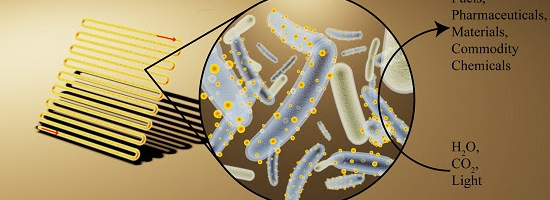
Artist’s rendering of bioreactor (left) loaded with bacteria decorated with cadmium sulfide, light-absorbing nanocrystals (middle) to convert light, water and carbon dioxide into useful chemicals (right).
(Kelsey K. Sakimoto)
Researchers designed tiny bacteria that can be more efficient than plants at converting sunlight into useful compounds. Plants accomplish this task with the help of chlorophyll, the green pigment that helps them absorb sunlight. Scientists have designed a cyborg bacteria that can achieve the same results in a more efficient way using semiconductor nanocrystals. In order to create these crystals, researchers fed Moorella thermoacetica certain chemicals that the bacteria synthesized into cadmium sulfide nanoparticles, which function as solar panels on their surfaces. Aside from being highly efficient, the process is also self-replicating and self-regenerating, making this a zero-waste technology.
Corresponding author:
Kelsey Sakimoto, Harvard University, Center for the Environment Cambridge, MA, US, Email: kelsey_sakimoto@fas.harvard.
This research was presented at the 254th National Meeting & Exposition of the American Chemical Society. Associated press release from ACS.

